Welcome to Trail Guide, your host through the wilds of the 2016 presidential campaign. It’s Monday, Jan. 25, and here’s what we’re talking about:
- Hillary Clinton and Bernie Sanders battle over judgment and experience, despite never sharing the stage during the Democratic town hall
- Our takeaways: The unusual format did little to break new ground or stop the candidates’ attacks
- President Obama implies that Clinton is progressives’ best hope, even as the White House scrambles to maintain an air of neutrality
- Ted Cruz’s time as Texas solicitor general offers a window into why he’s both loved and loathed, the Times’ Noah Bierman found
- Campaigning for Clinton, Julian Castro tests the vice-presidential waters
- Jeb Bush and Marco Rubio spend more on ads but have little to show for it
- Share via
Democratic town hall takeaways: Little new ground broken with unusual format
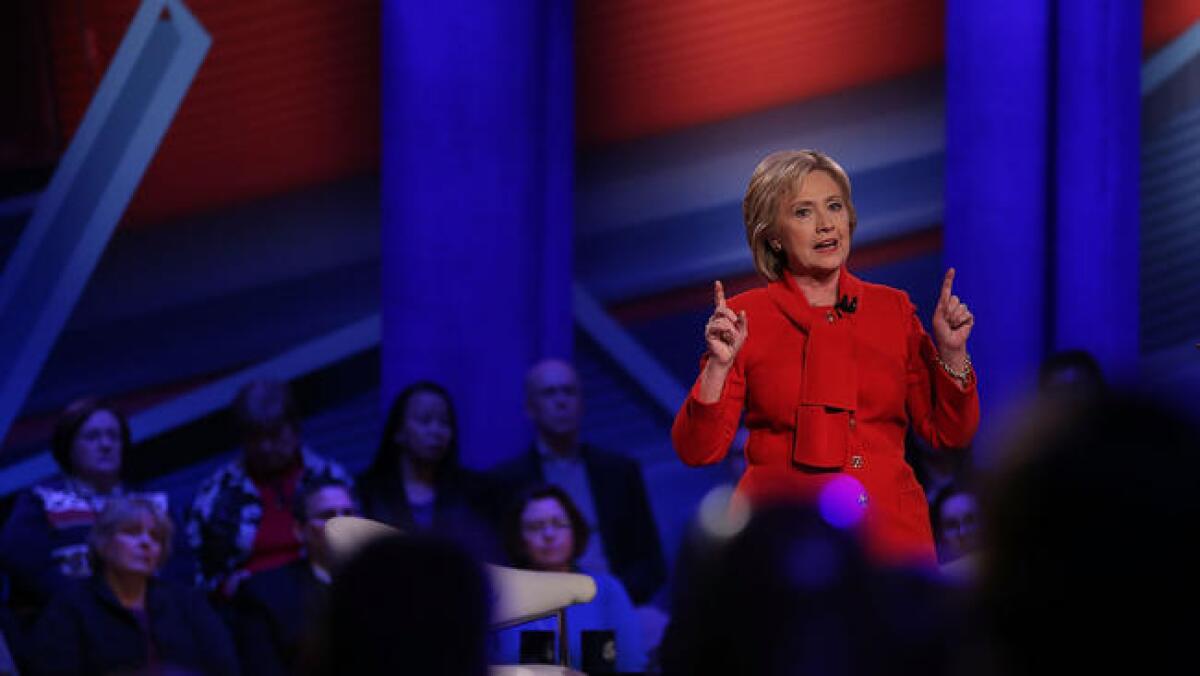
The three Democratic presidential candidates did not quite debate on Monday night. Instead, in one of the last chances for voters to see them before the Iowa caucuses on Feb. 1, they took separate questions from the audience of Democrats who plan to caucus. What we noticed:
Candidates stick to their scripts
The format allowed the candidates to hold mostly to their stump speeches when answering questions, with their opponents off stage, no pushback from the questioners and only a few follow-ups from moderator Chris Cuomo.
Bernie Sanders gets warm and fuzzy
Sure, there was plenty of talk about the 1% and the oligarchs. But the format, and perhaps the knowledge that he’s starting to become a serious candidate, pushed Sanders to get a little more personal than usual.
- Share via
Clinton says it was ‘tongue in cheek’ to call Republicans her enemy
Hillary Clinton said Monday that it was only “tongue in cheek” when during an October debate she listed “the Republicans” among the enemies that she was most proud of making.
The former secretary of State, a prime target of Republican attacks for decades, said she would work hard to find common ground with GOP members of Congress if she is elected president.
“I’m going to be just giving them all bear hugs, whether they like it or not,” Clinton said at a CNN town hall with Democratic presidential candidates in Des Moines.
Clinton recalled that as a U.S. senator from New York, she worked with Republicans to pass laws on foster care, adoption and healthcare coverage for children. She vowed to do the same to advance her policy agenda as president.
At the fall debate, CNN anchor Anderson Cooper asked candidates which enemies they were most proud of making, saying that Franklin D. Roosevelt once suggested that he be judged by that standard.
“Well, in addition to the NRA, the health insurance companies, the drug companies, the Iranians – probably the Republicans,” Clinton responded.
- Share via
Clinton argues her foreign policy experience is more ‘than one vote’ to support Iraq war
After being needled by Bernie Sanders over her 2002 vote in favor of war with Iraq, Hillary Clinton pointed to her work as secretary of State to argue that she has a far broader range of foreign policy experiences that show how she would lead if elected president.
“I have a much longer history than one vote,” Clinton said during a Democratic candidates’ town hall at Drake University here.
Among the examples Clinton cited was helping to create the coalition that imposed sanctions on Iran that eventually led to last year’s landmark nuclear deal.
“It’s imperative you do your very best … to avoid military action,” Clinton said in response to a question posed by an audience member. “It should be the last resort, not the first choice.”
She said the U.S. must pursue diplomacy, “even if it’s slow, boring, hard, to continue to persist and be patient to get results.”
Clinton noted that when she became the nation’s top diplomat, the Iranians were on a path to developing nuclear weapons. Many allies “just wanted to end that program by bombing them,” she said.
“We got the negotiation successfully done,” she said.
“So we have to be leading, that means we’ve got to be smart about how we try to assert our power so it is constructive, makes a difference and does lead to greater peace and prosperity,” Clinton said.
The three Democratic presidential candidates appeared individually onstage for about half an hour each. Sanders spoke first and hammered Clinton’s vote for war as a key difference in their records. Clinton has acknowledged that her vote was a mistake.
- Share via
Periodic reminder: Hillary Clinton’s email transparency is not a choice
Hillary Clinton said during Monday night’s town hall that she has made an effort to be more transparent by releasing all of her emails from her time as secretary of State and casting her move as unprecedented. But Clinton’s claim is misleading; she turned over her messages only after her use of a private email server was revealed. And several lawsuits filed by reporters would have eventually forced the release of the documents.
- Share via
Hillary Clinton laces into Donald Trump on Islamophobia
Hillary Clinton angrily denounced Donald Trump’s call for an open-ended ban on Muslim immigration to the U.S., calling it “not only shameful and contrary to our values” but dangerous.
It’s dangerous, she said Monday, because Trump’s harsh language has led to threats against Muslims living in the United States and because it undermines efforts to recruit foreign allies to help fight terrorism.
“We need a coalition that includes Muslim nations to defeat ISIS,” Clinton said, raising her voice, “and it’s pretty hard to figure out how you’re going to make a coalition with the very nations you need if you spend your time insulting their religion.”
Clinton, appearing at a Democratic town hall in Des Moines, was responding to a question from an Air Force veteran who wore a black burka and expressed concern about raising three children at a time of heightened animosity toward Muslims.
Clinton never mentioned Trump by name; instead she referred to “their” -- meaning the Republican Party’s -- “front-runner.”
But her contempt was clear from her angry tone and the disgusted look on her face.
“We cannot tolerate this,” she said to applause from the partisan audience, “and we must stand up and say every person in this country deserves to be treated with respect and we must stand up against the bullying.”
- Share via
Hillary Clinton offers an inclusive message for Republicans
I want to be the president for everyone.
— Hillary Clinton, in response to a question about what she would say to Republicans to win their votes
- Share via
Hillary Clinton welcomes Obama’s implicit support
- Share via
Bernie Sanders explains gun liability vote
There may be no issue that has bedeviled Bernie Sanders more than his 2005 Senate vote granting gun manufacturers exemption from liability lawsuits.
Hillary Clinton has repeatedly hammered Sanders over the vote, trying to squeeze to his political left by suggesting he is weak on gun control. She has seized on that vote as Exhibit A.
Sanders has said he would reconsider his support and offered an explanation at Monday night’s Democratic town hall in Iowa.
The senator suggested he had small gun shop owners in his home state of Vermont in mind when he cast his vote.
“You go out, buy that gun legally and you go out and kill somebody. I think the gun shop owner should not be held liable for your act. That’s what I believe,” Sanders said.
By contrast, he went on, if a gun manufacturer knows that a community is being flooded with weapons falling into criminal hands, the manufacturer should be held liable.
“So I am willing now to look at that legislation, maintain what was good in it, get rid of what is bad in it,” Sanders said.
- Share via
Sanders tries to sharpen contrast with Clinton
Bernie Sanders faulted Hillary Clinton on Monday for voting to authorize the Iraq war, a major liability during her 2008 run for president, and he questioned her commitment to fighting climate change, noting the long delay before she took a stand against the Keystone oil pipeline.
His language was mild, but Sanders nonetheless tried to sharpen contrasts with Clinton, recalling his own House vote in 2002 against the Iraq invasion and his argument on why the war would be unwise.
“It gives me no pleasure to tell you that much of what I feared happened,” the Vermont senator told the audience here at a CNN Democratic presidential town hall.
As for the proposed oil pipeline between Canada and Texas, Sanders said, “On Day One, I said the Keystone pipeline is a dumb idea.” For months, Clinton declined to take a stand on the pipeline, which environmentalists vehemently oppose. She announced her opposition in September, weeks before President Obama announced that he was rejecting the pipeline.
“Why did it take such a long time?” Sanders asked.
Sanders also defended a previous challenge to Clinton’s qualifications he made when he compared her experience to that of former Vice President Dick Cheney.
“Experience is important,” Sanders said. “But judgment is also important.”
- Share via
Who is Martin O’Malley?
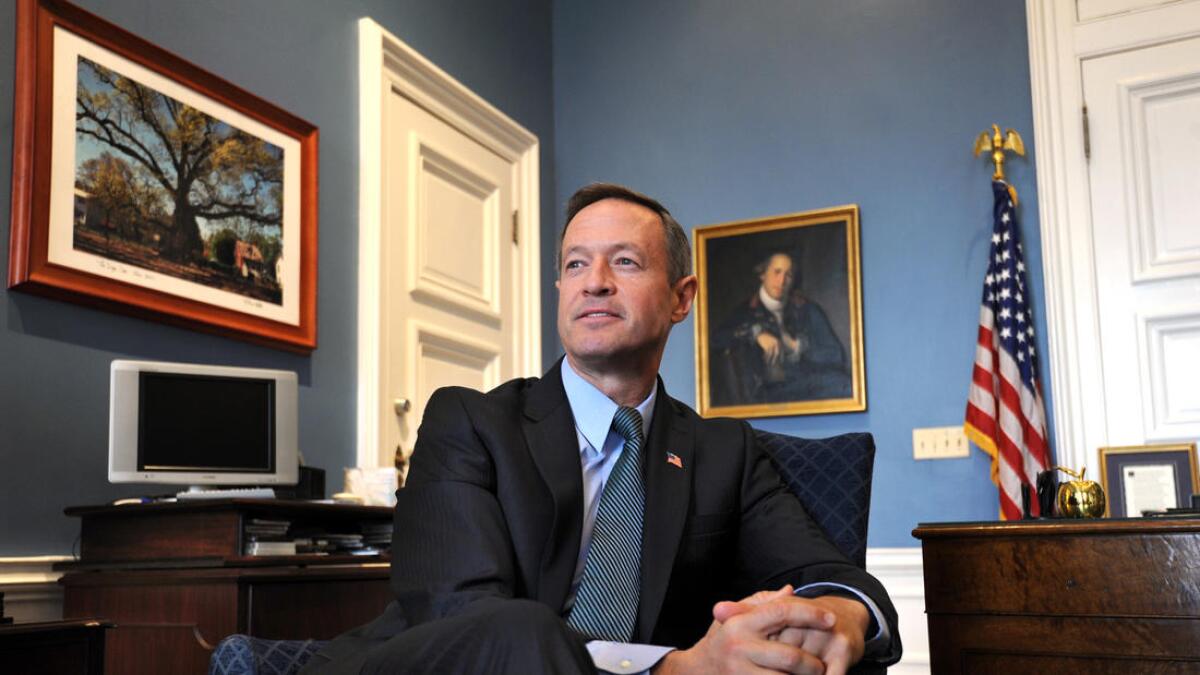
Martin O’Malley, the former governor of Maryland, is far less known than Democratic front-runner Hillary Clinton and has not gained the kind of notice Bernie Sanders has. Check out The Times’ rundown of all the presidential candidates to find out more about O’Malley.
- Share via
Sanders raises the issue of Iraq war vote in Iowa Democratic forum
Less than seven minutes into a Democratic candidates’ forum on Monday, Sen. Bernie Sanders dinged rival Hillary Clinton, though not by name.
Asked whether he had the capacity to focus on the full range of issues that confront an American president, he recalled the case presented by then-President George W. Bush and then-Vice President Dick Cheney in the run-up to Congress’ 2002 vote on the Iraq war.
“I said, ‘No. I think that war is a dumb idea,’” Sanders said during the town hall at Drake University in Des Moines.
Left unsaid, but well-known among the Democratic voters who will head to the first-in-the-nation Iowa caucuses in one week, is that Clinton voted to in favor of going to war. She has since then said the vote was a mistake, but the issue also dogged her during her unsuccessful 2008 presidential run.
- Share via
Bernie Sanders defends the high cost of his healthcare proposal
Bernie Sanders defended his Medicare-for-all proposal during Monday’s Democratic presidential forum, saying it would eliminate private health insurance premiums even if it requires higher taxes.
“We are the only country on Earth that allows private insurance companies to rip us off,” the Vermont senator said.
Sanders bemoaned “the outrageously high cost of prescription drugs,” saying the top three pharmaceutical companies made $45 billion in profits last year at a time when 1 in 5 Americans could not afford their medications.
“We will save middle-class people thousands of dollars a year on their healthcare bills,” he promised.
Sanders’ remarks at a CNN town hall in Des Moines came in response to a nurse who challenged his plan to expand Medicare when the program is already beset by problems.
- Share via
Who is Bernie Sanders?
The Times’ Mark Z. Barabak accompanied Vermont Sen. Bernie Sanders to Iowa months before he entered the presidential race and found that his passion for fighting for the working class runs deep.
- Share via
Lighthearted moment to open the Democratic town hall
My wife told me to button my coat, but I’m too fat.
— Vermont Sen. Bernie Sanders as he settled into his seat at the start of the Democratic town hall in Des Moines
- Share via
Donald Trump threatens to boycott debate because of Fox’s Megyn Kelly
With the next Republican presidential debate three days away, Donald Trump threatened Monday to boycott, saying moderator Megyn Kelly of Fox News was biased against him.
Trump insisted in an interview with CNN that Kelly “doesn’t treat me fairly.” In the first GOP presidential debate, Kelly asked Trump about his history of calling women “fat pigs, dogs, slobs and disgusting animals,” a question that infuriated the New York billionaire.
Trump later said Kelly had appeared so angry during the debate that “you could see there was blood coming out of her eyes, blood coming out of her wherever.” Many interpreted his statement as referring to menstruation, which Trump denied.
“I might be the best thing that ever happened to her,” said Trump, who has also often insulted Kelly on Twitter. “Who ever heard of her before the last debate?”
A Fox News representative responded in an email: “Sooner or later Donald Trump, even if he’s president, is going to have to learn that he doesn’t get to pick the journalists — we’re very surprised he’s willing to show that much fear about being questioned by Megyn Kelly.”
The debate Thursday night in Des Moines will be the last before the Feb. 1 Iowa caucuses, the first White House nominating contest of 2016.
- Share via
So who’s ahead in Iowa, Clinton or Sanders?
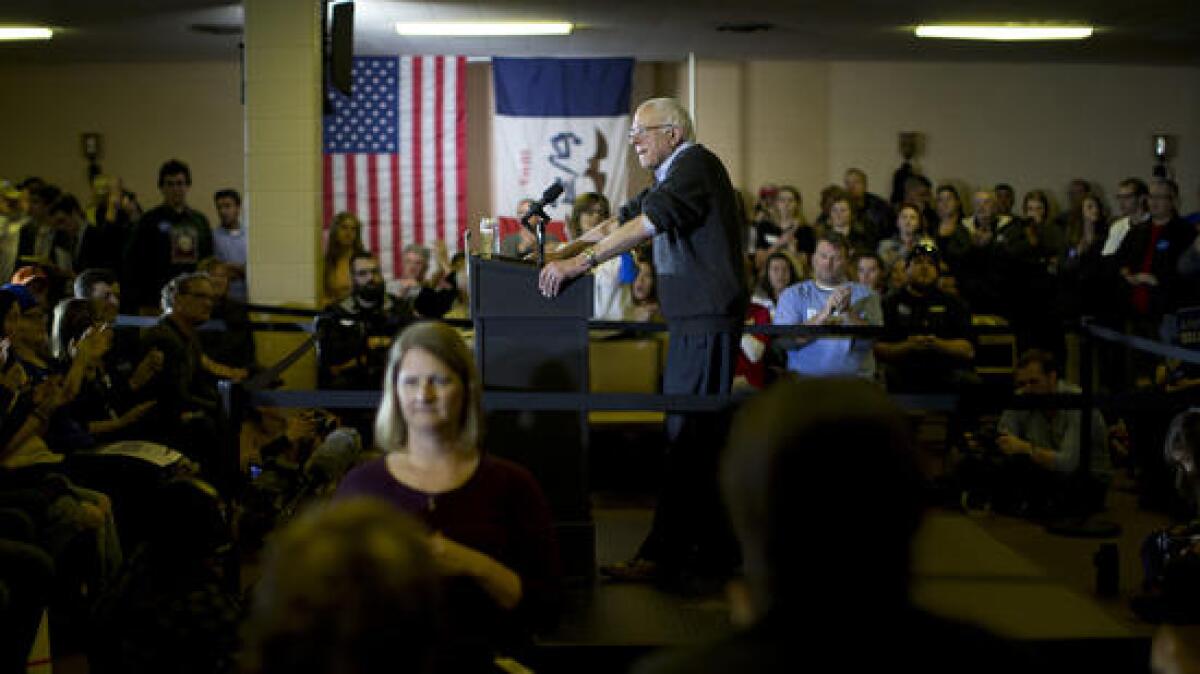
As the Democratic candidates prepare for their televised town hall meeting in Des Moines this evening, voters have been hit with a barrage of conflicting polls on the race.
At least 10 surveys have been publicly released in the last week and a half. Seven show Hillary Clinton leading, by margins of between 2 and 29 percentage points. Three show Bernie Sanders ahead by margins of between 1 and 8 percentage points.
Obviously, those can’t all be accurately describing the same electorate; margin of error, random fluctuation and voters changing their minds won’t account for that much variation.
So how to parse them? As I noted recently, one big difference among the polls is how they define who is likely to show up and vote at a caucus. The polls that cast a wide net -- implying a big turnout of first-time voters -- tend to show Sanders doing better.
Nate Cohn, who writes for the Upshot in the New York Times, points to another difference -- polls based on random-digit dialing have tended to show Sanders ahead, while those based on existing voter registration files have shown Clinton ahead.
The two facts point in the same direction: The race is close enough that either candidate could win. A Sanders victory would depend on turning out a lot of people who have not previously voted and potentially some who are not currently registered.
- Share via
Texas job was Ted Cruz’s ticket to the national stage -- and to loathing from colleagues
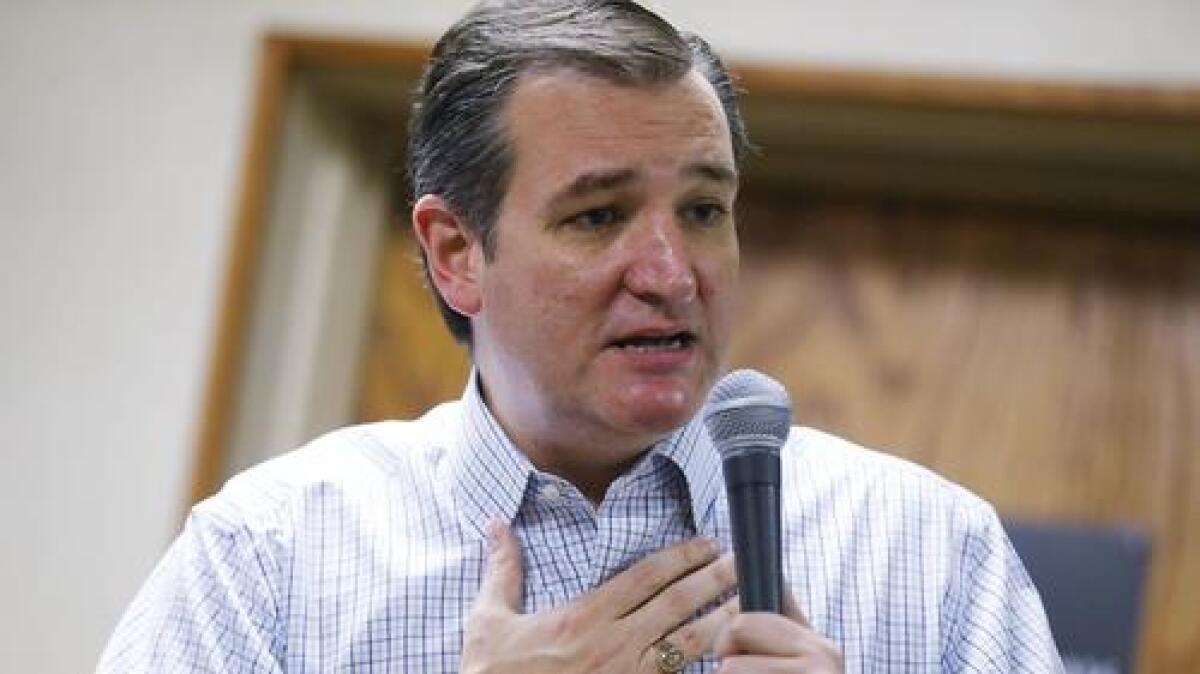
Ted Cruz was 31 and working in the George W. Bush administration, yet he felt his career had flat-lined. The Ivy Leaguer with the superstar pedigree and no shortage of confidence had figured he’d be a top presidential advisor by then, but by his own later admission, he had alienated too many colleagues.
That’s when Cruz got a call that would return him to Texas for a career reset. Over the next five years, he turned the relatively obscure position of state solicitor general into a political launch pad so powerful that today, at 46, he is a senator and has become Donald Trump’s main rival for the GOP presidential nomination.
During his tenure as Texas’ chief appeals lawyer, from 2003 through 2008, Cruz demonstrated the qualities that have made him loved and loathed on the national stage. He showed how to distill complex legal issues in a way that attracted public attention -- and often won cases. He drew hard ideological lines that pushed the limits of conservatism and foreshadowed his own party’s turn to the right. He showed drive, creativity and entrepreneurial energy.
He also displayed an ego and talent for self-promotion that expanded the influence of his office even as it drew resentment from some colleagues and subordinates, who say he was petty and inflated his role as he lusted for the cameras.
- Share via
Julian Castro, campaigning for Hillary Clinton, embarks on a vice presidential test run in Iowa
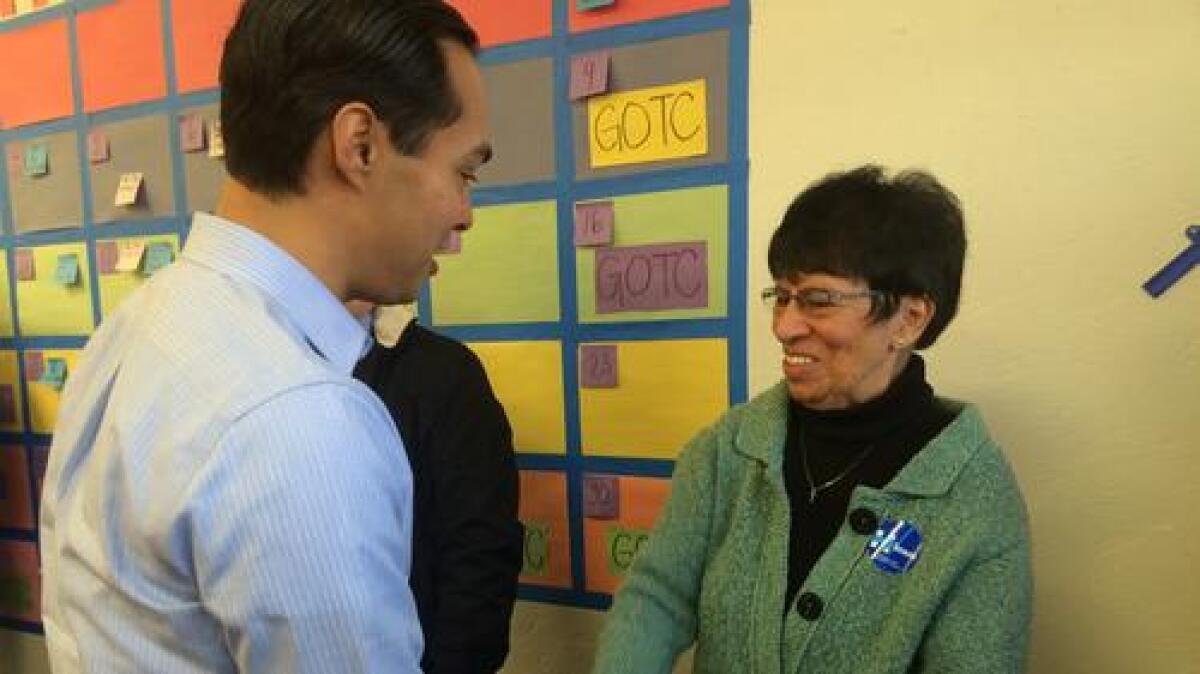
As the secretary of Housing and Urban Development and former mayor of San Antonio, Julian Castro’s ethnic roots, up-from-the-bootstraps story and quick ascent in politics have earned him comparisons to President Obama. He is frequently mentioned as a possible vice presidential pick for Hillary Clinton, should she prevail as the Democratic nominee.
In something of a test of Castro’s campaigning abilities, he barnstormed Iowa on Sunday in the final stretch leading up to the state’s Feb. 1 caucus. He visited several small cities with growing Latino populations and warned voters about the dire consequences of a Clinton loss and the possible return of the White House to Republican control.
“We absolutely can’t afford to hand over the presidency to the Republican Party,” Castro told a crowd in Fairfield, his second stop of the day. “Can you imagine what would happen if you have Speaker [Paul] Ryan, Senate Majority Leader [Mitch] McConnell and President Trump?”
“We’ve seen what they’ve done when they’ve had that kind of power,” he added, hinting at the kind of attack-dog sensibility that presidential candidates often rely on in a running mate.
- Share via
Ben & Jerry’s co-founder creates a batch of Bernie Sanders ice cream
The ice cream is called Bernie’s Yearning and is being made in an extremely limited batch as a personal endeavor by the ice cream maker’s co-founder. Its ingredients -- a solid disc of chocolate on top with mint ice cream underneath -- are intended to represent the inequality that Sanders has railed against.
- Share via
Iowa governor stands by his criticism of Ted Cruz
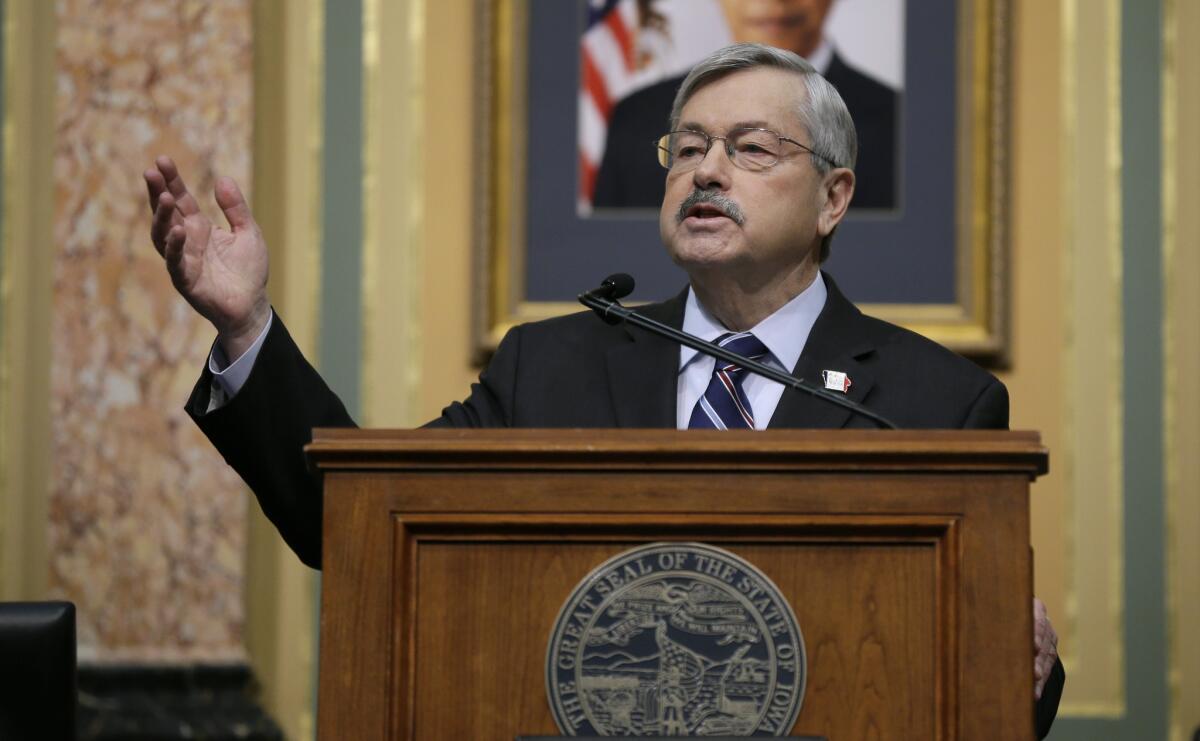
Iowa Gov. Terry Branstad isn’t apologizing for calling for Ted Cruz’s defeat here in next week’s caucuses.
“I just gave an honest answer to a point-blank question,” said Branstad, who caused waves last week when he told reporters that Cruz was a “big oil” candidate whose opposition to renewable energy mandates would hurt Iowa.
Speaking at his weekly news conference at the state capitol in downtown Des Moines on Monday, Branstad said his criticism of Cruz should not be read as an endorsement of GOP front-runner Donald Trump or anyone else in the Feb. 1 caucuses.
But, he said, it’s “critically important” that Iowa voters know where candidates stand.
“The voters of Iowa will make their choice,” he said. “I just want to make sure it’s an informed choice.”
Branstad opposes Cruz’s call for an end to the Renewable Fuel Standard, a law that requires oil refineries to blend in gasoline biofuels such as corn-based ethanol, an important industry in the state.
The governor said candidates vying for Iowa votes need to respect the state’s economy.
“Come to Iowa,” he said, “but stand for things that are important for our state and our country.”
He stressed that he was avoiding making an endorsement.
“I’m not backing any candidate,” he said. “I’m just advocating on behalf of my state.”
- Share via
Ted Cruz’s supporters fight back by citing Donald Trump’s praise in new ads
Super PACs backing Ted Cruz are up with new ads in Iowa -- including one heaping praise on the senator from his chief rival for the Republican presidential nomination, Donald Trump.
“One of the reasons I like Ted Cruz so much is that he’s not controversial,” Trump says to laughs at a 2014 GOP dinner in Florida.
The ad harks back to that earlier era of bromance -- about a month ago, or a lifetime on the campaign trail -- between the two front-runners as they fight for dominance in Iowa.
Along with another ad bashing views Trump once held in support of abortion, the ad is aimed at knocking back Trump’s lead over Cruz in Iowa in recent polls, ahead of next week’s caucus.
The spots are part of a previously announced $2.5-million ad buy in Iowa and South Carolina, the super PACs said.
- Share via
Chris Christie criticized for returning to New Hampshire amid winter storm recovery
New Jersey Gov. Chris Christie slammed a television reporter Monday for questioning his return to the campaign trail a day after a blizzard socked in the East Coast.
The snowstorm caused severe flooding in southern New Jersey, and Christie returned to the state to oversee emergency relief operations, but he went back to campaigning Sunday in New Hampshire. He defended his trip and said any criticism of his priorities is simply an attempt to damage his campaign.
“I don’t even know what critics you’re talking about,” Christie argued on MSNBC’s “Morning Joe.” “There is no residual damage, there is no flooding damage. All of the flooding receded yesterday morning. And there was no other damage. People were driving around the streets yesterday morning of New Jersey.”
Mayors in New Jersey have said the flooding from the snowstorm was worse than from Superstorm Sandy, which devastated the New Jersey coastline.
But Christie insisted that he didn’t need to remain in the state.
Christie is toward the back of the pack in polls of Republican voters but has campaigned frequently in New Hampshire in hopes of notching a strong showing there to boost his campaign. Christie, a former U.S. attorney, insisted Monday that he can undertake the best “prosecution” of Democratic front-runner Hillary Clinton in a general election.
“We’ll see how it goes when people actually start to vote,” he finished.
- Share via
Some Republicans spend big on ads, but have little to show for it
It’s a complete waste of money, and I think people are starting to figure that out.
— Barry Bennett, a Republican strategist, on the proliferation of campaign ads among candidates who see little correlating support in polls
- Share via
What to look for at tonight’s Democratic town hall
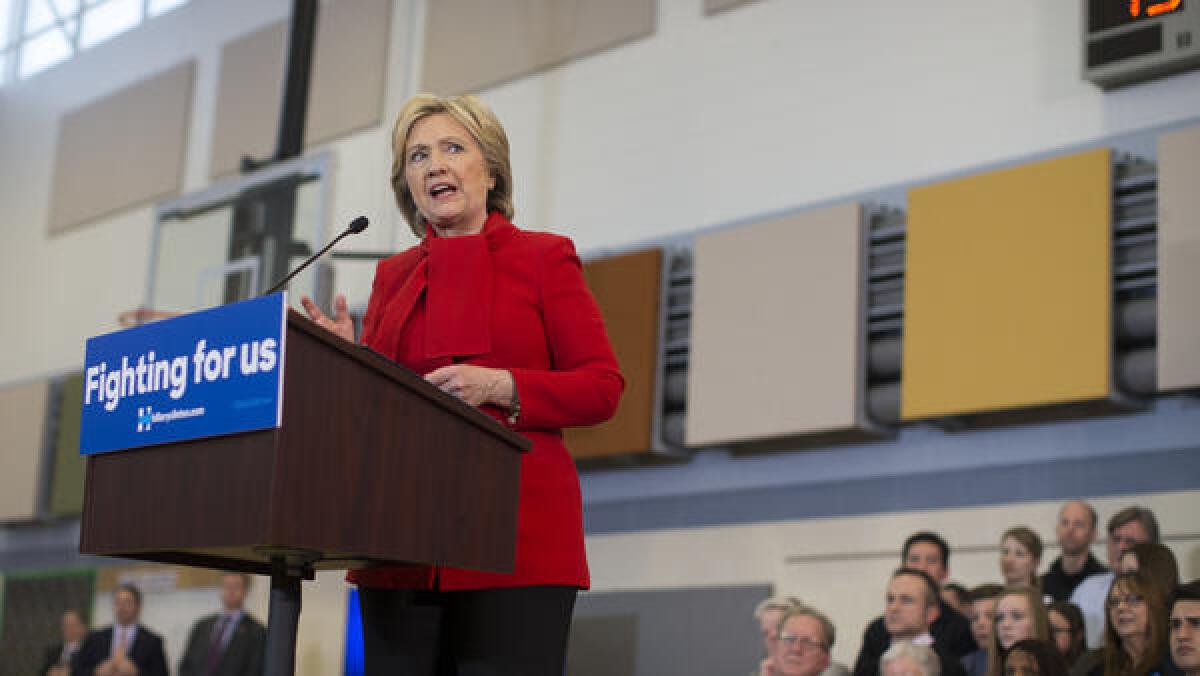
Locked in a tight battle to win next week’s opening nominating contest of the 2016 election, the two leading Democratic presidential candidates, Hillary Clinton and Bernie Sanders, will seek whatever edge they can in front of voters Monday at a town hall in Des Moines.
The two offer somewhat similar visions but contrasting strategies: Clinton, the former secretary of State, has pitched herself as a pragmatic progressive who will build on President Obama’s efforts, while Sanders, a senator from Vermont, has had unexpected success by calling for nothing less than a political revolution to fight inequality.
The town hall at Drake University, which will be moderated by CNN, was announced only last week. Unlike a typical debate, the three candidates won’t be onstage at the same time. Instead, they’ll appear separately to give a speech and answer questions from moderators and members of the audience.
- Share via
Obama weighs in, carefully, on Democratic nomination fight
President Obama on Monday waded more deeply into the contentious Democratic primary race than he ever has, touting the strengths of both leading candidates while intimating that Hillary Clinton is the stronger contender.
A week before the Iowa caucuses open the nominating contests, he also predicted in a podcast interview with Politico that no matter the party, the candidate “who can project hope” will ultimately prevail in succeeding him.
Obama spent more time in the interview listing Clinton’s strengths than rival Bernie Sanders’, but stayed away from anything resembling an endorsement. He acknowledged that some of Clinton’s chief assets are also her weaknesses, noting that she began the race with the “privilege and burden” of being perceived as the front-runner, and thus was under more scrutiny. But he also underscored Clinton’s message that she is the liberals’ best hope for accomplishing policy change.
- Share via
Donald Rumsfeld says Trump has ‘touched a nerve’ for Republican voters
A decade or two ago, Republican voters wouldn’t have seriously considered Donald Trump’s presidential campaign — but 2016 is a different race, former Secretary of Defense Donald Rumsfeld said Monday.
Rumsfeld, an advisor to two former presidents, Gerald Ford and George W. Bush, said Trump’s campaign has “touched a nerve in our country,” and that voters respond to the GOP front-runner like no other politician.
“It’s amazing, this election year,” Rumsfeld said on NBC’s “Today.” “It’s so different from most, if not all, of the earlier ones I remember.”
While Trump and Texas Sen. Ted Cruz have risen to the top of the GOP field by embracing stark proposals on immigration, foreign policy and defense, Rumsfeld said Vermont Sen. Bernie Sanders offers a similar effect on the Democratic side by calling for radical changes through a progressive lens.
“The fact that Bernie Sanders and Donald Trump are able to draw 10-, 15-, 20-, 30,000 people to hear them speak says there’s something going on in our country that they’re appealing to in a very interesting, unusual way,” Rumsfeld said.
Rumsfeld, whose former boss’ brother, Jeb Bush, is also running for president, didn’t endorse any candidate.
- Share via
Michael Bloomberg has a long way to go, poll suggests
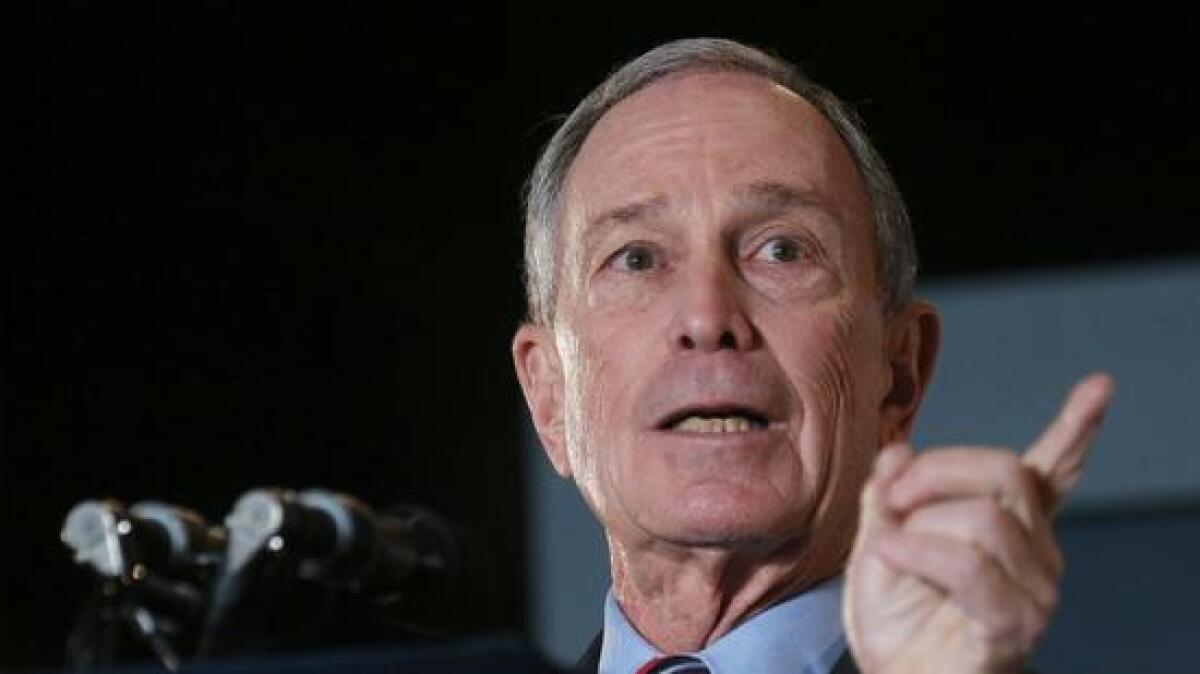
Former New York Mayor Michael Bloomberg, who is flirting with the idea of becoming the second Manhattan-based billionaire to jump into the presidential race, would have a long, tough road ahead, a new poll suggests.
Morning Consult, the polling and media firm, had a survey in the field last week when the New York Times floated the Bloomberg trial balloon. As with any poll that purports to say how voters would react nine months in the future, the results need a very large dose of salt. But they do provide some valid information about where the potential candidate would start off.
In a three-way race with Donald Trump as the GOP nominee and either Hillary Clinton or Sen. Bernie Sanders as the Democratic choice, Bloomberg would start with about 12% of the vote, according to the survey. His share of the vote would be about the same if either Sen. Ted Cruz or Sen. Marco Rubio were the GOP nominees, the poll found.
Bloomberg’s vast fortune -- he’s considerably wealthier than Trump -- could certainly increase his name recognition and, perhaps, boost his support. On the other hand, third-party candidates almost always lose altitude toward the end of a campaign as voters decide not to cast a vote for someone who seems unlikely to win.
As for those now in the race, the poll projects a close contest, with Sanders and Clinton running close to a tie with Trump but doing better against either Cruz or Rubio.
The online poll was conducted Jan. 21-24, surveying 1,439 registered voters. Results have a 95% likelihood of being accurate to within +/- 3 percentage points.